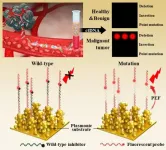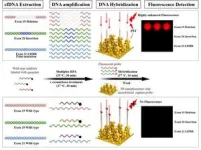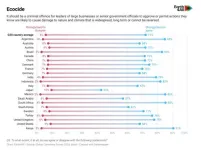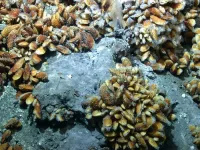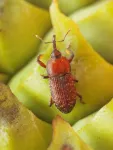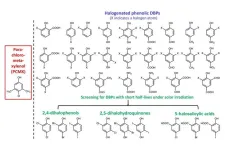(Press-News.org) Dr. Min-young Lee and Dr. Sung-gyu Park of the Advanced Bio and Healthcare Materials Research Division at KIMS have developed a technology that can detect cancer mutant genes in blood with the world's highest sensitivity of 0.000000001% based on plasmonic nanomaterials for optical signal amplification. The team tested blood samples from lung cancer patients (stages 1-4) and healthy individuals for EGFR mutations and achieved a diagnostic accuracy of 96%.
Previously utilized genetic analysis technologies had low analytical sensitivity to detect mutated genes compared to normal genes, making it difficult to accurately diagnose early-stage cancer patients. In addition, it was difficult to establish a quick treatment strategy and apply it to screening tests due to the high cost and long time required for analysis and the need for special equipment. To overcome these challenges, the research team developed a low-cost analysis technology that can analyze various cancer mutations within the target gene region within 1 hour with an ultra-high sensitivity of 0.000000001%. This technology boasts the world's highest level of sensitivity, which is 100,000 times better than the highest level of 0.0001% among reported technologies, and through this, the possibility of early diagnosis was confirmed using the blood of lung cancer patients.
This technology combines nanomaterial technology that significantly improves the fluorescence signal, and primer/probe design that suppresses the fluorescence signal of normal genes, amplifying only the fluorescence signal of cancer mutant genes. This is because the accurate detection of even very small amounts of cancer mutated genes requires not only strong fluorescent signal expression technology but also precise discrimination of fine fluorescent signals. The team fabricated a biochip in the form of a microarray capable of simultaneously detecting three mutant genes of EGFR (deletion, insertion, and point mutations) on a plasmonic substrate made of three-dimensional, high-density gold nanostructures. After evaluating the clinical performance of 43 domestic lung cancer patients (stages 1 to 4) and 40 normal groups, a clinical sensitivity of 93% for lung cancer patients and a clinical specificity of 100% for the normal group were confirmed.
This technology can play an important role in not only early diagnosis and detection of recurrence of cancer, but also in monitoring treatment effectiveness and establishing personalized treatment plans. In addition, liquid biopsy using blood is possible as an alternative to surgical tissue biopsy, reducing the burden on patients and simplifying the examination process. It can also serve as a regular screening test, ultimately improving the quality of cancer management and treatment.
Senior researcher Min-young Lee said,“Because it is capable of comprehensively detecting various cancer mutations with the world’s highest level of ultra-high sensitivity, it can become a leading player in the early cancer diagnosis and treatment/recurrence monitoring market,”and added, “We expect that this will greatly improve the survival rate and quality of life of cancer patients.”
This research was funded by the Ministry of Science and ICT’s Nano Materials Technology Development Project (hosted by the Korea Institute of Materials Science). Additionally, the research results were published online on June 26 in the world-renowned academic journal‘Small Science’(IF: 11.1, first author Dr. Ji-young Lee) and were also selected as the cover paper (Inside Front Cover). Currently, the research team is conducting expanded development of early diagnosis technology for various cancers, such as lung cancer, colon cancer, breast cancer, and pancreatic cancer, and is seeking technology transfer companies for commercialization.
----------------------------------------------------------------------
###
About Korea Institute of Materials Science(KIMS)
KIMS is a non-profit government-funded research institute under the Ministry of Science and ICT of the Republic of Korea. As the only institute specializing in comprehensive materials technologies in Korea, KIMS has contributed to Korean industry by carrying out a wide range of activities related to materials science including R&D, inspection, testing&evaluation, and technology support.
END
Detects cancer genes with ultra-high sensitivity!
The Korea Institute of Materials Science(KIMS) has developed the world's most sensitive technology for detecting cancer mutant genes in blood
2024-09-06
ELSE PRESS RELEASES FROM THIS DATE:
Study suggests US droughts, rainy extremes becoming more severe
2024-09-06
COLUMBUS, Ohio – Severe drought in the American Southwest and Mexico and more severe wet years in the Northeast are the modern norm in North America, according to new research – and the analysis suggests these seasonal patterns will be more extreme in the future.
The middle of the United States, meanwhile, can expect bigger swings between wetter wet periods – high-rainfall years known as pluvials – and drier summers through the rest of this century, the study predicts.
Researchers at The Ohio State University say the findings, based on modern precipitation data, historical tree rings and climate models ...
Quality assurance in histopathology laboratories
2024-09-06
The medical field is inherently susceptible to errors, with laboratory tests being no exception. In histopathology laboratories, where tests are considered the gold standard for diagnosing various diseases, errors can significantly impact patient outcomes. Quality Control (QC) and Quality Assurance (QA) programs are essential in minimizing these errors and ensuring the generation of accurate and reliable reports. The complex, multistep nature of histopathology work, combined with the subjective nature of many diagnostic interpretations, ...
Causing environmental damage should be a criminal offense, say 72% of people surveyed in G20 countries
2024-09-06
Nearly three out of four people (72%) surveyed across 18 G20 countries1 support making it a criminal offence for government or leaders of large businesses to approve or permit actions which cause serious damage to nature and climate, finds major new research. This finding is part of the latest Global Commons Survey 2024, conducted by Ipsos UK and commissioned by Earth4All and the Global Commons Alliance (GCA).
The research follows recent landmark legislative changes, including in Belgium where ecocide was recognised as a federal crime earlier this year. Related laws ...
Natural probiotic discovered in UK newborns microbiomes
2024-09-06
Newborn babies have one of three pioneer bacteria in their gut shortly after birth, one of which could be used to develop new personalised infant therapeutic probiotics, researchers show.
In the largest study of UK baby microbiomes to date, researchers from the Wellcome Sanger Institute, University College London (UCL), and the University of Birmingham, used whole genome sequencing to analyse stool samples from 1,288 healthy infants, all under one month old from the UK Baby Biome Study1.
This research, published today (6 September) ...
Hijacking the command center of the cell: nuclear parasites in deep-sea mussels
2024-09-06
Most animals live in intimate relationships with bacteria. Some of these bacteria live inside the cells of their hosts, but only very few are able to live inside cell organelles (structures inside the cell, like organs in the body). One group of bacteria have figured out how to colonize the nuclei of their hosts, a remarkable feat given that the nucleus is the control center of the cell.
To date, nothing is known about the molecular and cellular processes that these intranuclear bacteria use to infect and reproduce in animal hosts. A group of scientists from the Max Planck Institute for Marine Microbiology in Bremen, Germany, now presents the first in-depth analysis ...
The heat generated by the tissues of some plants has played a crucial role in the evolutionary history of insect pollination
2024-09-06
Thermogenesis is a process by which organisms generate internal heat. Although it is usually associated with animals, some plants have also developed this ability. This metabolic process allows certain parts of the plant, such as flowers and inflorescences, to raise their temperature above that of the surrounding environment. Today, these plants, which include cycads and some angiosperms (flowering plants), rely on insects for pollination. The heat they generate helps volatilize and disperse floral fragrances and other chemical compounds that attract insects such as beetles, flies, and ...
Global experts help nanomedicines DELIVER on healthcare promise
2024-09-06
They’re tiny drug-delivery systems 1000 times smaller than a human hair, but while nanomedicines have long been hailed as the future for treating debilitating and life-threatening diseases, their journey from lab to patient has many challenges.
Now, new findings from a global team of expert scientists in academia and industry has generated world-first research quality standards that will help slash costs and reduce the time it takes to develop advanced nanomedicine treatments and make them available for patients.
Published in Nature Nanotechnology today, and led by the University of South Australia’s Dr Paul Joyce and the University ...
Galaxies are much much bigger than we thought
2024-09-06
If this galaxy is typical, then the study, published today in Nature Astronomy, indicates that our galaxy is already interacting with its closest neighbour, Andromeda.
Where does a galaxy end and deep space begin? It seems like a simple question until you look more closely at the gas that surrounds galaxies, known as the circumgalactic medium.
The halo of gas surrounding the stellar disc accounts for about 70% of the mass of the galaxy – excluding dark matter – but until now has remained something of a mystery. In the past we have only been able to observe the gas by measuring the light from a background object, ...
AI helps distinguish dark matter from cosmic noise
2024-09-06
Dark matter is the invisible force holding the universe together – or so we think. It makes up around 85% of all matter and around 27% of the universe’s contents, but since we can’t see it directly, we have to study its gravitational effects on galaxies and other cosmic structures. Despite decades of research, the true nature of dark matter remains one of science’s most elusive questions.
According to a leading theory, dark matter might be a type of particle that barely ...
HKUST engineering researchers discover an effective and environment-friendly disinfectant
2024-09-06
A widely used disinfectant worldwide, chloroxylenol, has been associated with eco-toxicological threats in water environments due to its relatively high chemical stability and massive consumption. Researchers at the School of Engineering of the Hong Kong University of Science and Technology (HKUST) have discovered a promising alternative known as 2,6-dichlorobenzoquinone (2,6-DCQ), which works more effectively in combating certain common bacteria, fungi and viruses, and can be rapidly degraded and detoxified in receiving waters.
This groundbreaking study is led by Prof. ZHANG Xiangru from HKUST's ...
LAST 30 PRESS RELEASES:
Roadmap for Europe’s biodiversity monitoring system
Novel camel antimicrobial peptides show promise against drug-resistant bacteria
Scientists discover why we know when to stop scratching an itch
A hidden reason inner ear cells die – and what it means for preventing hearing loss
Researchers discover how tuberculosis bacteria use a “stealth” mechanism to evade the immune system
New microscopy technique lets scientists see cells in unprecedented detail and color
Sometimes less is more: Scientists rethink how to pack medicine into tiny delivery capsules
Scientists build low-cost microscope to study living cells in zero gravity
The Biophysical Journal names Denis V. Titov the 2025 Paper of the Year-Early Career Investigator awardee
Scientists show how your body senses cold—and why menthol feels cool
Scientists deliver new molecule for getting DNA into cells
Study reveals insights about brain regions linked to OCD, informing potential treatments
Does ocean saltiness influence El Niño?
2026 Young Investigators: ONR celebrates new talent tackling warfighter challenges
Genetics help explain who gets the ‘telltale tingle’ from music, art and literature
Many Americans misunderstand medical aid in dying laws
Researchers publish landmark infectious disease study in ‘Science’
New NSF award supports innovative role-playing game approach to strengthening research security in academia
Kumar named to ACMA Emerging Leaders Program for 2026
AI language models could transform aquatic environmental risk assessment
New isotope tools reveal hidden pathways reshaping the global nitrogen cycle
Study reveals how antibiotic structure controls removal from water using biochar
Why chronic pain lasts longer in women: Immune cells offer clues
Toxic exposure creates epigenetic disease risk over 20 generations
More time spent on social media linked to steroid use intentions among boys and men
New study suggests a “kick it while it’s down” approach to cancer treatment could improve cure rates
Milken Institute, Ann Theodore Foundation launch new grant to support clinical trial for potential sarcoidosis treatment
New strategies boost effectiveness of CAR-NK therapy against cancer
Study: Adolescent cannabis use linked to doubling risk of psychotic and bipolar disorders
Invisible harms: drug-related deaths spike after hurricanes and tropical storms
[Press-News.org] Detects cancer genes with ultra-high sensitivity!The Korea Institute of Materials Science(KIMS) has developed the world's most sensitive technology for detecting cancer mutant genes in blood
